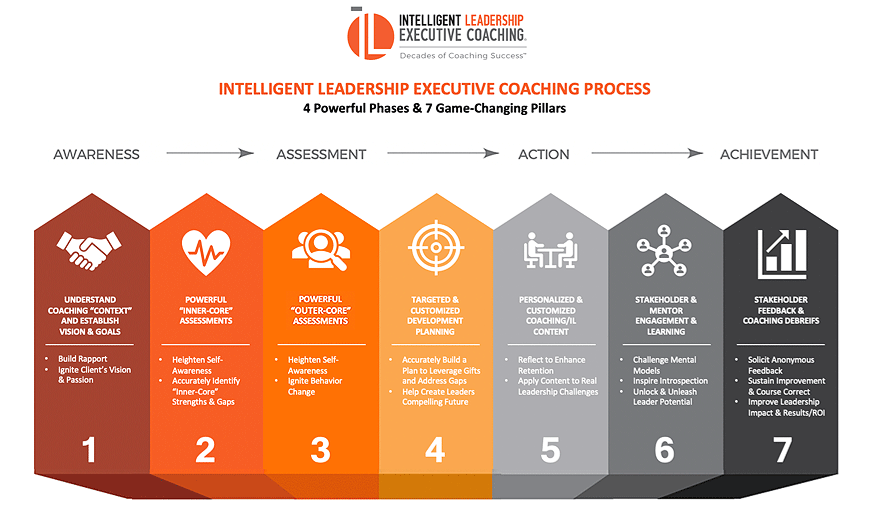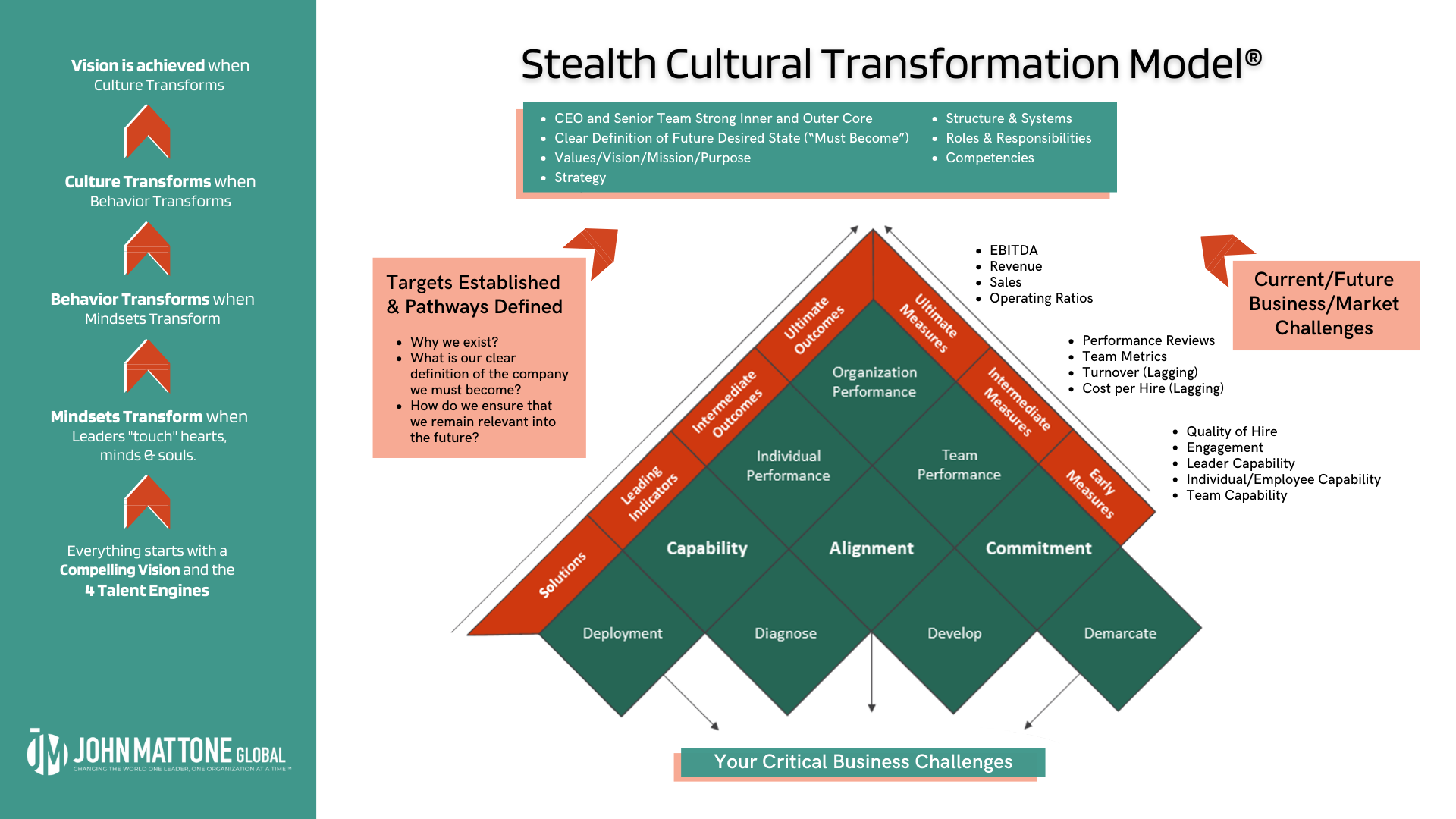Intelligent Leadership Executive Coaching
In a world where leadership demands constantly evolve, John Mattone Global (JMG) offers executive coaching designed to help you stay ahead. By partnering with JMG, you’ll join the ranks of elite leaders worldwide who have successfully elevated their impact through Intelligent Leadership®.

Why Choose JMG’s Intelligent Leadership® Coaching?
- Guaranteed Results: Experience measurable improvement in leadership effectiveness within six months.
- Global Expertise: We’ve empowered leaders in over 55 countries to grow, adapt, and thrive.
- Cultural Insight: Tailored coaching that respects and integrates regional cultural values.
- Top Coaching Credentials: The John Mattone Global certification program, with 192 International Coaching Federation (ICF) credits, is among the top 5 globally, ensuring that our coaches are among the best and most effective globally.
“Take the next step in your leadership journey and experience transformation with JMG’s proven methodology.”
AS SEEN ON
What You’ll Achieve with John Mattone and JMG Executive Coaching
With JMG’s business coaching, you’ll gain the skills, insights, and resilience needed to excel in today’s complex global landscape. A specialized business coach will support your executive development, helping you navigate challenges related to remote leadership and improve self-awareness through tailored coaching programs.
- Sustainability and Relevance: Lead effectively in an ever-evolving business landscape, where remaining relevant and resilient is critical.
- Excel in Competitive Markets: Strengthen your strategic insight to lead in a highly competitive environment, managing diverse, international teams with confidence.
- Navigate Complex Leadership Structures: Master leadership within hierarchical or top-down organizations, especially in government or royalty-led entities.
- Develop Future Leaders: Build a robust pipeline of high-potential talent ready to lead in both local and global contexts.
- Enhance Critical Skills: Improve strategic decision-making and emotional intelligence through targeted coaching, tailored to your unique challenges. Coaching for executives is a transformative tool for enhancing leadership skills and organizational alignment, fostering a culture of feedback and collaboration.
- Sustain Peak Performance: Integrate work-life balance strategies to maintain energy and effectiveness in demanding professional landscapes.
Achieve excellence, sustainability, and growth with JMG’s support.
A few of JMG’s Executive Coaching Clients










John Mattone Global: Your Guide to Executive Leadership Coaching Excellence
John Mattone Global (JMG) is a world-renowned executive coaching firm founded by John Mattone—the #1 executive coach recognized by Global Gurus. With a powerful blend of experience, unique methodology, and a global reach, JMG is trusted by the world’s top industry leaders.
Executive coaches at JMG support leaders with personalized strategies focused on enhancing leadership effectiveness, managing personal challenges, and fostering professional growth.

What Sets JMG’s Intelligent Leadership Executive Coaching Apart
- Proven Methodologies: Our Intelligent Leadership® coaching, backed by 16 registered trademarks, combines deep inner-core and outer-core development.
- Exclusive Assessments: Proprietary tools like the Mattone Leadership Enneagram Inventory® (MLEI) and Strategic-Tactical Leadership Index-360® (STLI-360) for customized insights.
- Global Cultural Expertise: With coaching experience across 55 countries, we provide culturally informed guidance.
- Tailored Executive Coaching Services: Our executive coaching services are designed to enhance leadership effectiveness and organizational success through customized programs, regular virtual sessions, and a focus on measurable outcomes.
Start your journey with JMG and see the transformation in your leadership.
Want to work with the Best?
Schedule Your Consultation Now.
What is Executive Coaching?

Understanding the Fundamentals of Executive Coaching
Executive coaching is a personalized and structured process designed to help senior leaders and executives achieve their full potential and drive business results. It involves working with a trained executive coach who provides guidance, support, and challenge to help leaders develop the skills, knowledge, and mindset necessary to succeed. Executive coaching is a collaborative process that focuses on identifying and addressing the leader’s strengths, weaknesses, opportunities, and threats, and developing strategies to improve their leadership skills and performance.
The Plan: 3 Steps to Transformational Leadership
At John Mattone Global, our executive coaching process is designed to make transformation accessible, sustainable, and impactful. With a clear, three-step approach, we help you take immediate action toward leadership growth and measurable results.
3-Step Plan to Unlocking Your Leadership Potential
- Schedule Your Complimentary Strategic Session
Meet with our team to discuss your unique challenges and goals. We’ll uncover your vision and the specific obstacles to achieving it. - Receive Your Customized Coaching Blueprint
Through proprietary assessments like the Mattone Leadership Enneagram Inventory® (MLEI) and the Strategic-Tactical Leadership Index-360® (STLI-360), you’ll receive a personalized coaching plan tailored to maximize your strengths and address development areas. - Begin Your Transformation Journey
Start implementing your customized roadmap with the guidance of a JMG Master Elite Coach. We’ll be with you through every coaching session, helping you build resilience, enhance effectiveness, and achieve sustainable growth.
Start today with a complimentary consultation. Together, we’ll create a personalized roadmap that empowers you to build resilience, boost effectiveness, and maximize your potential.
Take Action: Begin Your Leadership Transformation
The journey to exceptional leadership begins with a single step. Don’t wait to become the leader you aspire to be.
Schedule Your Complimentary Strategic Session
Connect with us today and take the first step towards transformative leadership. Let us show you what’s possible.
Real Results from Transformative Executive Coaching
Stay Ahead in a Changing World
Why Choose Executive Coaching?
It’s natural for leaders to question whether coaching is the right step. With competing priorities, they may feel that they can navigate challenges independently or already know the strategies they need. However, even the most skilled leaders benefit from an objective, strategic perspective to sustain growth and impact over time. Coaching provides a unique advantage: actionable insights, accountability, and a clear pathway to overcoming challenges and seizing opportunities.
The Risks of Navigating Alone
Without dedicated coaching, leaders may encounter obstacles that are challenging to address without an outside perspective:
Plateauing Progress:
Leaders who rely solely on their current knowledge and experience often find it difficult to push past growth plateaus.
Missed Alignment:
Unaddressed blind spots can lead to unintended misalignment with organizational goals, impacting team cohesion and morale.
Increased Team Turnover:
Team engagement may wane without effective leadership, leading to higher turnover and potential talent loss.
“Leaders who invest in coaching create a foundation for ongoing success and resilience. Strategic development today prevents stagnation, boosts team morale, and creates measurable impact tomorrow.”
“Ready to Begin Leadership Transformation? Schedule Your Consultation Now.”
Achieve Breakthroughs in Leadership and Organizational Impact
With John Mattone Global’s executive coaching, leaders gain the tools, self-awareness, resilience, and essential coaching skills needed to excel in today’s complex environments. Our approach empowers leaders to achieve breakthroughs in leadership and organizational impact, making an immediate and lasting difference on their teams and organizations. These measurable outcomes are achieved through our LeaderWatch® metrics and transformational IL coaching.
Success Outcomes with JMG Executive Coaching
By partnering with JMG, you’ll experience real, sustainable change in critical areas of leadership:
.
Enhanced Emotional Intelligence
Deepen your understanding of team dynamics and sharpen interpersonal skills to build stronger, more cohesive teams.
Effective Decision-Making
Strengthen decision-making frameworks, allowing you to address complex challenges and make strategic, impactful choices confidently.
Resilience and Adaptability
Build the resilience needed to face constant change and turn today’s challenges into tomorrow’s successes, sustaining growth through every phase of your career.
Imagine Your Potential
Imagine leading with confidence and clarity, making impactful decisions, and seeing your team thrive under your guidance. With JMG’s Intelligent Leadership coaching, you can unlock your full potential and create a legacy of excellence.
Igniting Breakthrough Leadership Performance & ROI
John Mattone Global’s coaching doesn’t just promise growth—it delivers measurable, transformative change. By leveraging our exclusive LeaderWatch® tool, we track real, quantifiable improvements in critical leadership competencies. Our coaching clients experience substantial gains in key areas that drive both individual and organizational success.
JMG’s coaching is backed by a commitment to results, with 100% of executives reporting measurable improvement within six months. When you partner with JMG, you invest in sustained, impactful leadership growth.
Agility with Change & People
%
Improvement
Creativity & Innovation
%
Improvement
Building & Sustaining
a Positive Team Culture
%
Improvement
One-On-One Communications
%
Improvement
Overall Leadership
%
Improvement
“Our clients experience transformational change that strengthens their teams, boosts performance, and creates lasting value for their organizations.”
The Power Behind Intelligent Leadership
- Intelligent Leadership Process: With 16 registered trademarks and counting, our IL process is recognized globally for its innovation and effectiveness in leadership development, with frameworks like the Stealth Cultural Transformation Model®.
- Heart and Soul Leadership: Learn to amplify care, concern, communication, compassion, and collaboration—essential qualities for excelling in any leadership position anywhere in the world.
- Comprehensive Coaching Services: From individual C-level coaching to holistic team and cultural transformations, we address all facets of leadership development.
- Recognized Authority: With a track record validated by global leaders and forward-thinking organizations, JMG’s coaching is a cornerstone for both leaders and organizations to achieve sustainable success.
- Independent Research: John Mattone Global recognized by Worldwide Research Reports (2023) and Statsdata (2024) as the world’s premier boutique executive coaching firm.
Coaching Designed for Every Level of Leadership
At John Mattone Global, we understand that every leader has unique challenges and growth opportunities. Our Intelligent Leadership® coaching is tailored to address the specific needs of each level of leadership, from C-level executives to emerging leaders.
C-Level Executive Coaching
High-stakes, strategic executive and leadership coaching designed to help senior executives maintain vision, resilience, and competitive advantage in high-pressure roles.
- Develop Resilience and Executive Presence: Master the skills required to thrive in high-pressure, multicultural environments, reinforcing your influence and impact.
- Lead with Purpose and Clarity: Inspire teams and stakeholders alike with a refined, mission-driven approach to leadership.
Executive Coaching for Management Leaders
Focused coaching for VPs, Directors, and Managers through JMG’s leadership coaching services enhances effectiveness, boosts team engagement, and encourages innovative thinking.
- Increase Emotional Intelligence and Team Alignment: Strengthen your impact by developing emotional intelligence and aligning teams for greater cohesion and results.
- Enhance Adaptability and Professional Growth: Lay a strong foundation for future roles by building adaptability and advancing your leadership toolkit.
Coaching for Small Business Entrepreneurs
Strategic guidance for entrepreneurs, helping them build foundational skills, align vision with growth, and create scalable, sustainable strategies through JMG’s business coaching services.
- Develop Business Strategy and Identify Blind Spots: Gain clarity on your business strategy and uncover areas of improvement to fuel growth and avoid common pitfalls.
- Achieve Sustainable Performance: Drive your business forward with strategic insights that support long-term success.
Coaching for High Potentials and Emerging Leaders
Accelerated coaching to help emerging leaders build self-awareness, develop fundamental leadership skills, and prepare for future roles.
- Strengthen Foundational Skills: Develop essential leadership capabilities, from effective communication to strategic decision-making through JMG’s team coaching. This approach helps foster collaboration, manage conflict, and instill essential values for team success.
- Prepare for Advanced Roles: Build resilience, adaptability, and insight, setting the stage for success in executive-level roles.
Team Coaching and Leadership Development
Team coaching is an essential component of leadership development, as it enables teams to work more effectively together and achieve their goals. Team coaching involves working with a team to identify their strengths and weaknesses, develop strategies for improvement, and enhance their communication and collaboration skills. Some of the benefits of team coaching include:
- Improved Communication and Collaboration: Team coaching helps team members communicate more effectively and collaborate towards common goals.
- Increased Trust and Respect: By fostering a culture of trust and respect, team coaching enhances relationships among team members.
- Enhanced Problem-Solving and Decision-Making Skills: Teams become better equipped to tackle challenges and make informed decisions.
- Improved Productivity and Performance: Effective team coaching leads to higher productivity and better overall performance.
- Increased Employee Engagement and Satisfaction: Engaged and satisfied team members are more likely to contribute positively to the organization’s success.
Comprehensive Coaching Engagements: What You Receive
John Mattone Global provides a comprehensive, personalized coaching experience that combines in-depth diagnostics, real-world application, and continuous progress monitoring. Each engagement is tailored to align with your unique goals and your organization’s mission, ensuring that every step of the coaching journey contributes to meaningful growth.
Personalized Diagnostics and Real-World Shadowing
Every engagement begins with detailed diagnostics that clearly understand your strengths and development areas.
- Diagnostic Interviews
We start with in-depth interviews to explore your leadership style, values, and aspirations. - MLEI® and STLI-360® Assessments
These proprietary assessments give insights into your inner and outer leadership core, helping us craft a tailored coaching approach. - Leadership Shadowing
Real-world shadowing allows your coach to observe you in action, providing actionable feedback on how to maximize your impact in high-stakes situations.
Customized Leadership Development Plan for Leadership Development
Based on your diagnostics, your coach will work with you to create a custom Leadership Development Plan. This plan is designed to align with your goals and your organization’s vision, ensuring that every step is strategic and purpose-driven.
Continuous Monitoring and Feedback
With our LeaderWatch® tool, we offer ongoing feedback to monitor progress and ensure accountability. Regular check-ins and feedback loops align you with your development goals, allowing you to adjust and optimize your strategies as you grow.
“Our process is grounded in unbiased feedback, clear metrics, and actionable insights, giving you the tools to achieve lasting success.”
Engagement Options:
Choose from 3, 6, 9, or 12+ month engagements,
depending on your unique leadership needs and objectives
Schedule Your Call with Nicholas Mattone,
CEO of John Mattone Global
The consultation will be with Nicholas Mattone, CEO of John Mattone Global, ensuring that potential clients receive personal attention from the leadership team.

The Essential Role of Executive Leadership Coaching
In today’s dynamic and unpredictable business landscape, executive leadership coaching is no longer optional—it’s essential for leaders who strive to sustain peak performance and drive meaningful impact. Senior leaders are expected to possess a finely tuned blend of strategic vision, self-awareness, emotional intelligence, and resilience. Yet, these qualities are not simply “acquired.” They are cultivated through continuous reflection, intentional growth, and expert guidance.
At John Mattone Global (JMG), our executive coaching meets leaders where they are, supporting them in deepening their inner-core strength while enhancing their outer-core competencies. When leaders invest in developing their inner core—their values, character, and emotional maturity—they unlock their full potential to lead with purpose, make sound decisions under pressure, and inspire loyalty in their teams. Through JMG’s personalized Intelligent Leadership® coaching, executives learn to face challenges with confidence, navigate complexity, and build lasting legacies that drive their organizations forward.
The Impact of Executive Coaching
Executive coaching with JMG produces transformational change, elevating both individual leaders and their organizations. Key benefits of our Intelligent Leadership® coaching include:
- Mastery of Critical Leadership Skills
Our coaching empowers leaders to sharpen essential skills like strategic decision-making, communication, and emotional intelligence, strengthening their ability to lead with clarity and impact. - Deepened Self-Awareness
Self-awareness is the foundation of authentic leadership. JMG coaching helps leaders uncover their blind spots, embrace their strengths, and align their actions with their values—resulting in greater confidence and authenticity. - Enhanced Leadership Performance
Through targeted coaching, executives experience measurable improvements in performance and productivity, refining their ability to make informed, high-stakes decisions that drive results. - Balanced Approach to Work and Life
Sustainable success requires balance. We help leaders develop strategies to prioritize effectively, manage their energy, and achieve a healthy integration of personal and professional commitments. - Increased Team Engagement and Retention
Well-coached leaders are equipped to foster trust, engagement, and enthusiasm within their teams, creating a culture that attracts and retains top talent.
The Key Components of Intelligent Leadership® Executive Coaching
Effective executive coaching is not a one-size-fits-all endeavor. At JMG, our Intelligent Leadership® coaching process includes several core elements that create a transformative experience:
- Clarity of Vision and Purpose
Our process begins by identifying each leader’s unique goals, aligning the coaching engagement with both individual aspirations and organizational priorities. - Supportive, Trust-Based Environment
Transformation requires vulnerability. Our coaching creates a safe space for leaders to explore challenges openly, making room for honest reflection and deep growth. - Focus on Inner and Outer Core Development
Leaders thrive when both their inner and outer cores are strong. Inner-core work involves character and values alignment, while outer-core work develops competencies like communication and strategic thinking. This balanced approach is what makes Intelligent Leadership® so powerful. - LeaderWatch® for Measurable Progress
We utilize the proprietary LeaderWatch® system to capture ongoing feedback from key stakeholders, enabling leaders to track and celebrate their growth in real time while staying accountable to their development goals. - Evidence-Based, Proprietary Methodologies
Our coaching integrates the Mattone Leadership Enneagram Inventory® (MLEI) and Strategic-Tactical Leadership Index-360® (STLI-360) to provide actionable insights into each leader’s unique strengths and opportunities for growth.
The Role of the Executive Coach: Facilitating Breakthroughs in Leadership
In the Intelligent Leadership® framework, the executive coach plays a pivotal role in guiding leaders to their highest potential. Our coaches are not mentors or consultants—they are facilitators of insight and transformation, trained to help leaders unlock their own answers and chart a path to their goals. The executive coach’s role is to provide clear, honest feedback, serve as a sounding board, and challenge leaders to stretch beyond their comfort zones.
A JMG coach creates a supportive, non-judgmental environment where leaders feel empowered to explore their challenges, embrace new perspectives, and achieve sustainable growth. By offering targeted insights and proven tools, our coaches enable leaders to turn aspirations into actions, continually expanding their impact on their teams and organizations.
Intelligent Leadership® Coaching Models and Methodologies
JMG’s coaching approach is rooted in proprietary, research-backed methodologies that have been refined through years of experience with top global executives. While our coaching engagements are fully customized, we often draw on the following models and frameworks to support leaders in achieving transformational change:
- The Intelligent Leadership® Blueprint
This model is designed to strengthen both the inner and outer core of leaders, aligning their character, courage, and values with the essential skills needed to lead effectively. - The 4 A’s of Intelligent Leadership®
We focus on helping leaders cultivate Altruism, Affiliation, Achievement, and Abundance—the foundational pillars for sustained greatness, positive relationships, and lasting impact. - LeaderWatch® Feedback System
Through LeaderWatch®, we track progress based on ongoing feedback from a leader’s key stakeholders, creating accountability and providing real-time insights that drive continuous improvement.
Every coaching journey with JMG is a personalized partnership, purpose-built to empower leaders to maximize their potential, embody authentic leadership, and leave a legacy of excellence.







